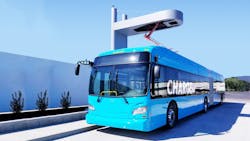Canada Infrastructure Bank commits up to C$400 million for city of Ottawa’s 450 zero-emission bus expansion
The city of Ottawa and the Canada Infrastructure Bank (CIB) have announced an agreement in principle, which would see the CIB invest up to C$400 million (US$331 million), supporting OC Transpo’s adoption of 450 zero-emission buses (ZEBs) by 2027.
This is the CIB's second ZEB investment commitment with a large municipality and supports the largest conversion of public transit vehicles in Canada to date. The ZEB investment commitment is another important step towards achieving the government of Canada's goal of 5,000 ZEBs.
“Cleaner air, quieter streets, and a planet safe for our kids - that's the goal. By partnering with the city of Ottawa, the Canada Infrastructure Bank will help bring 450 new zero-emission buses to the streets of Ottawa, towards our commitment of 5,000 more zero emission buses across the country,” said the Honorable Catherine McKenna, Minister of Infrastructure and Communities.
The electrification of vehicles is a key initiative to help the city's goal of reducing GHG emissions in city operations by 100 percent by 2040 and demonstrates the city's commitment to lead by example. Each battery-electric bus will provide a savings of 35,000 liters of fuel every year, which is the annual consumption of a conventional diesel-powered bus.
“Switching from diesel buses to battery-electric is one of the most impactful actions we can take to meet Ottawa's goal of reducing by 100 per cent the GHGs emitted from City operations by 2040,” said Ottawa Mayor Jim Watson.
As outlined in the city's report, Zero-Emission Buses for OC Transpo, to be considered at the Transit Commission on June 16, city staff will request approval from Ottawa City Council to enter into agreements with the CIB. As part of the city's 2022 capital budget, OC Transpo will recommend purchasing 74 40-foot battery-electric buses and the required charging infrastructure, for entry into service in 2023.
The CIB's loan will cover the higher upfront capital costs of ZEBs compared to diesel buses, helping to accelerate the electrification of the city's bus fleet. Financial savings are estimated to be substantial, as lifetime operating costs for ZEBs could be as much as 35 per cent lower than diesel buses.
Energy supply and charging infrastructure for this proposed transition will be supplied through an agreement with Hydro Ottawa.
The Canada Infrastructure Bank has a commitment to invest C$1.5 billion (US$1.24 billion) in zero-emission buses and associated infrastructure, which will be coordinated with Infrastructure Canada's new funding for zero-emission transit. This program, expected to formally launch in the near future, will support the purchase of zero-emission public transit and school buses.
*Conversion rate for CAD to USD June 8, 2021



